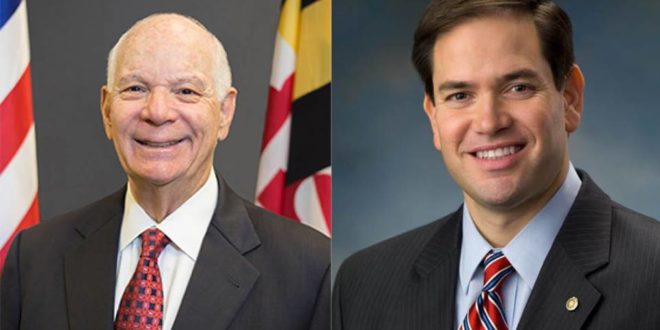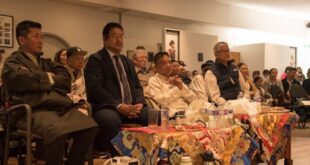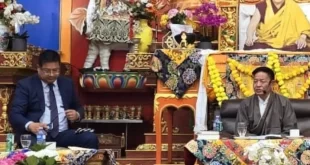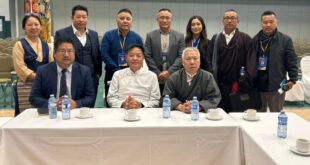Tuesday, April 4, 2017
WASHINGTON – U.S. Senator Ben Cardin (D-Md.), Ranking Member of the Senate Committee on Foreign Relations, and Senator Marco Rubio (R-Fla.), Chairman of Senate Foreign Relations subcommittee on democracy, human rights, and global women’s issues, have written to Secretary of State Rex Tillerson in advance of President Trump’s meetings this week with Chinese President Xi. The senators urged Secretary Tillerson to “make human rights a top priority, both publicly and privately” in the discussions.
“The crack down on civil society and deterioration of rule of law in China in the past few years appears to signal a systematic effort by Chinese Communist Party leadership to tighten its controls on free expression and undermine the will of its own people, including the rights of its ethnic minorities guaranteed under China’s own Constitution,” Cardin and Rubio wrote. “[T]he United States should not simply stand idly by as these universal rights are abrogated and the Chinese people suffer the consequences. A failure of U.S. leadership on these issues is not a good message for the United States to send to China, our allies in the region, and the world.”
The text of the letter follows
April 4, 2017
The Honorable Rex Tillerson
Secretary of State
U.S. Department of State
2201 C St. NW
Washington, D.C. 20520
Dear Secretary Tillerson,
According to news reports and State Department transcripts your recent trip to China featured only one public mention of human rights concerns in the context of our bilateral relationship. As President Trump prepares to host Chinese President Xi, we urge you to make human rights a top priority, both publicly and privately, in your discussions. For over three decades since Tiananmen Square, the United States has been a stalwart supporter of human rights, freedom of the press, civil society, and the rule of law and due process in China. We must not hesitate to stand up for these values. This support for human freedom has existed across multiple administrations, both Democrat and Republican, and in lockstep with our partners around the world.
As you know, the past several years have seen an alarming crack down on civil society and lack of respect for the rule of law in China, including documented cases of torture and other cruel, inhuman or degrading treatment of human rights lawyers and defenders. The State Department’s 2016 Human Rights Report on China finds that “repression and coercion of organizations and individuals involved in civil and political rights advocacy as well as in public interest and ethnic minority issues remained severe.” As such, we urge that you raise the human rights cases of Xie Yang, Li Heping, Wang Quanzhang, Li Chunfu, Wu Gan, and Jiang Tianyong in your meeting with President Xi, all of which and hundreds others are featured in the Political Prisoner Database maintained by the Congressional-Executive Commission on China. We also request that you raise the cases of Nobel Prize winner Liu Xiaobo, who remains imprisoned for peacefully calling for change in China, and his wife Liu Xia, who is under de facto house arrest. These cases remain a black mark on China’s record.
We were surprised and disappointed to learn the United States had declined to join the United Kingdom, Germany, Canada and other nations on a letter urging China to investigate torture claims against lawyer Xie Yang and others, and raising serious concerns about human rights in China. The United States should never be silent or absent when universal values are in question. When we shy away from supporting human rights issues in China, we betray our own interests and values. While China remains a highly repressive state, many of China’s democracy activists and human rights defenders have repeatedly told us that U.S.-led support for their cause has made a substantial impact on conditions on the ground.
The crack down on civil society and deterioration of rule of law in China in the past few years appears to signal a systematic effort by Chinese Communist Party leadership to tighten its controls on free expression and undermine the will of its own people, including the rights of its ethnic minorities guaranteed under China’s own Constitution. We hope you will urge China to do more to improve the cultural and spiritual plight of Tibetans, not just their economic status. The continued anguish of the Tibetan people and especially the series of self-immolations by young Tibetans are deeply distressing. Just like in Tibet, China appears unwilling to comply with its international human rights commitments in Xinjiang, where Uighurs continue to report systemic torture, and restrictions on religious freedom and movement. Additionally, the failure to respect the yearning of the people of Hong Kong for universal suffrage, and the cycle of arrests of pro-democracy activists, appears to signal that China is headed in the wrong direction with regard to its respect for Hong Kong’s Basic Law and the “one country, two systems” policy. We are concerned that the selection of Carrie Lam to be the next chief executive of Hong Kong, and Beijing’s interference in that process, will only continue to deepen the divisions among the people of Hong Kong and suppress fundamental democratic rights.
In recent years, it has become more evident that promoting universal values, particularly the rule of law, is also critical to our economic and security interests in China. The U.S.-China relationship is not just between our governments but also between businesses, academic institutions, civil society and our citizens. China’s legislation on non-governmental organizations, cybersecurity, and counter-terrorism has had chilling effect on all aspects of our security and economic relationship. U.S. businesses and NGOs depend on clear and fair rules that an independent judiciary can enforce. China’s punitive denials of visa applications for American journalists, writers, and scholars who want to work in China undermines our bilateral relationship.
In the end, it is up to China’s government to do more to respect the rights of its own people. But the United States should not simply stand idly by as these universal rights are abrogated and the Chinese people suffer the consequences. A failure of U.S. leadership on these issues is not a good message for the United States to send to China, our allies in the region, and the world. We firmly believe that a full and frank discussion of our concerns regarding human rights and civil society in China would serve to strengthen our relationship.
We look forward to your thoughts for how these issues will be addressed as part of the upcoming visit with President Xi, as well as part of the broader set of U.S.-China dialogues and discussions.
Sincerely,
##




